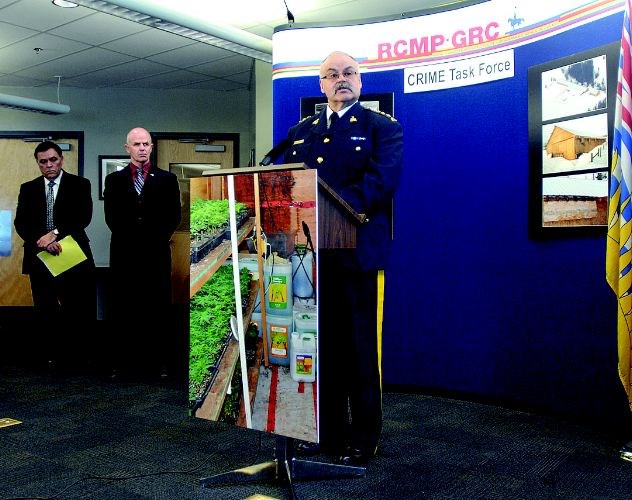The Cariboo Region Integrated Marijuana Enforcement (CRIME) Task Force is only six months old but it has seized more than 75,000 illegal marijuana plants, put handcuffs on 36 suspects, shut down 35 grow-operation sites, and gathered intelligence from the Cariboo backcountry to the Lower Mainland to Asia.
And it has another six months before its federal-provincial-municipal joint funding purse is empty.
"We expect all those numbers to go higher," said Const. Michael McLaughlin, the RCMP's media liaison member assigned to the CRIME operation during a press briefing Tuesday.
"The amount of marijuana seized is slightly more than seven tonnes."
The average size of a Cariboo grow-op is, according to University of the Fraser Valley (UFV) professor and crime researcher Darryl Plecas, about 1,100 plants which is worth about $500,000 per year. He is part of the CRIME team as a data analyst.
"I and my [UFV] colleagues have been studying this issue of grow-ops for 14 years now," Plecas said. "Disappointingly, the problem has gotten larger in that 14 years. There are five times the number of grow-ops in the Cariboo now than leading up to 2000, and these 'grows' are typically five times larger than the ones before 2000... What that means is a strengthening of the organized crime interests in this area, and all the consequences we knew about in the 1990s worsening."
Chief Supt. Barry Clark is the RCMP commander for the entire North District, which includes the Cariboo and a total of 70 per cent of the B.C. land mass.
He said the problem is not confined to the Cariboo, but there is a noticeable concentration of these operations in that area.
He credited the Cariboo public for sending in piles of tips that got the RCMP's investigational resources pointed at clandestine marijuana plantations, and that continues to roll in to the various detachments involved.
"The vast majority of those arrested are not from the Cariboo," said Clark. "They are largely from the Lower Mainland with ties to Asia."
McLaughlin told The Citizen that these Cariboo suspects predominantly have recent roots to Viet Nam and China.
"The majority are in Canada legally," he said. "Intelligence gathering is always a priority when there are international ties, the RCMP has a lot of international connections, and we work with many partner agencies in Canada and outside of Canada, but that is not something I can get into regarding these suspects."
The past six months have been dominated by winter conditions, so indoor grow-ops have been the order of the day for investigators working with CRIME, but with spring on the way they know, said investigators, that outdoor marijuana fields will soon be part of their sleuthing regimen.
None of those arrested so far have been prosecuted. In fact, none have been officially charged yet. That is simply standard procedure, said McLaughlin, because these cases are so new.
The RCMP and Crown counsel have to have a strong prosecution package together on each suspect before formal charges can be laid and the court cases go forward. That is in the works now.
Others, who were caught in the Cariboo earlier in the organized crime history of the region, have been charged and sentenced.
"Generally speaking, the grow-ops are located on relatively cheap, isolated land, and the larger grows are contained in purpose-built buildings," said McLaughlin.
"Massive amounts of electricity are often provided by leaky, highly polluting diesel generators."



